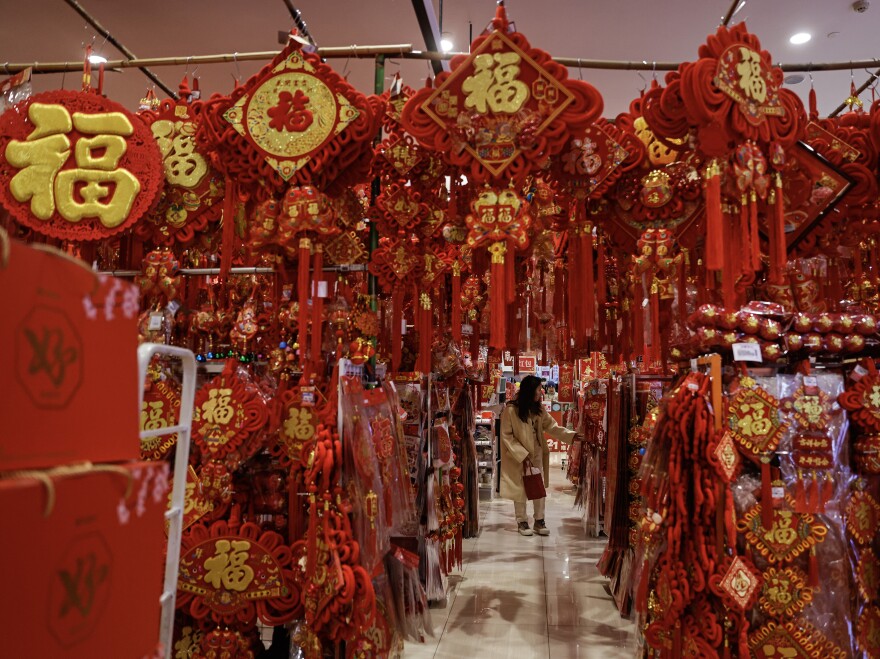SHANGHAI — While U.S. stocks have been soaring, Chinese shares have been on a seemingly interminable downward slide.
China's benchmark CSI 300 index is down by nearly 20% over the past 12 months and is hovering near a five-year low. The Hong Kong stock exchange's Hang Seng China Enterprises Index has dropped more than 4% since the start of the year and by 25% since this time last year.
Chinese stocks have fallen by around half since they peaked in early 2021, and they are hovering around five-year lows.
The government in Beijing has taken note and in recent weeks has been trying to stop the bleeding. But analysts say the malaise is a symptom of bigger problems dogging China's beleaguered economy, and until those problems get addressed, the stock market is unlikely to recover.
In a stock trading hall in Shanghai at a brokerage called Red Tower Securities, retirees swap rumors and make a few trades. Investor Zhang Huijuan says it has been brutal.
"Lots of people have lost money," she says. She points one by one at her friends sitting nearby. "She lost money. She lost money. She lost money."
One pipes up. "How can you have a good Lunar New Year without money? Our kids have been laid off, they're unemployed, and here we are stuck in this market," she says.
The Lunar New Year, China's biggest holiday, is just around the corner. But analysts say this problem is going to take a lot longer to fix.
"As economists, we tend to believe stock market is a proxy of economy," says Robin Xing, the China economist at Morgan Stanley.
And the economy isn't in great shape. Official statistics put Chinese economic growth at 5.2% last year, but many experts think nominal growth was slower. Xing says deflation has been a major problem, and he points to the "GDP deflator," a measure of inflation that includes both consumer prices and investment.

"It has been in negative territory for three quarters in a row. That's the longest and deepest deflation since the 1998 Asian financial crisis," he says.
The worst deflation in a generation has been driven by weak demand, which itself is underpinned by sluggish growth in the wake of the COVID-19 pandemic, and government policies to reduce crippling debt, which has brought the real estate sector to its knees.
The Chinese government reported gross domestic product growth of 5.2% last year, a figure that many economists think is unlikely, given the pervasive weakness of the economy. Xing says nominal GDP growth, factoring in deflation, has been subpar.
Businesses have been cutting back on spending and hiring, which has created uncertainty.
In response to the market turmoil, the leadership fired the securities regulator. The cabinet has also pledged more forceful measures to boost confidence in the market. Beijing has also limited short-selling to de-incentivize market falls.
Bloomberg News reported that authorities are considering a stabilization fund worth around $280 billion, to prop up share prices. And Reuters has reportedstrong buying activity in recent days, consistent with what analysts say is a pattern of market-buoying action at times of trouble by the "national team" of state-backed investment firms.
Stocks have bounced in recent days on optimism that the authorities are finally taking steps that show they are serious about stopping the downward spiral.
"I think for the past week or so, these policies coming out, it sends a message that the government cares about the market," says Winnie Wu, China strategist at Bank of America in Hong Kong.
Investors have grown wary
So far, the effects have been limited. But Wu expects the intervention to ultimately make a difference — at least in the way it eventually did in 2015 and 2016, during the market's last big nosedive.
"I would say this time it's probably the same thing in the sense that these policies are good enough to stop that downside," she says, referring to the possibility that shares continue to fall indefinitely. "But it's not good enough — or it's not even intended — to drive a rally or drive a bull market."
For that, she says, China has to address its macroeconomic challenges — deflation, a property crisis, low confidence and consumption and unanswered questions about what sectors are going to propel the Chinese economy into the future.
In the meantime, the research firm Gavekal Dragonomics said in a report last month that it expects economic growth to improve in the coming months "almost entirely due to more policy support."
"Still, it is difficult to assess the exact impact on economic growth, because it's not clear how much more fiscal and monetary support is in the pipeline," it said.
For Shanghai-based investors like 35-year-old Alex Wang, the whole experience has been eye-opening.
In 2020, he put thousands of dollars of his savings into mutual funds focused on new energy, pharmaceuticals and liquor. He says he doubled his money by the next year but has lost it all since — and then some.
Asked whether he would consider investing more in the future, once things settle down, his answer is an unequivocal no — he will not be putting money into the stock market again.
"This," he says, "is the kind of lesson you only need to learn once."
Aowen Cao contributed reporting from Shanghai.
Copyright 2024 NPR. To see more, visit https://www.npr.org.





